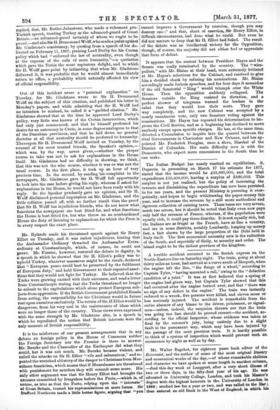It is the misfortune of our present arrangements that in
any debate on foreign policy in the House of Commons neither the Foreign Secretary nor the Premier is there to answer. Mr. Bourke and the Chancellor of the Exchequer did what they could, but it was not much. Mr. Bourke became violent, and called the attacks on Sir H. Elliot " vile and calumnious," and re- peated the wretched oldatory of the danger to Christians from Mus- ;adman fanaticism, which means that if Mussulmans are threatened with punishment for murders they will commit some more. His Only other argument was that Sir Henry Elliot had brought the excesses committed by Irregulars before the Porte,—which is, of course, as true as that the Porte, relying upon the " interests" of Great Britain, treated his representations as mere forma. Sir Stafford Northcote made a little better firm, arguing that "you
cannot improve a Government by coercion, though you may destroy one ;" and that, short of coercion, Sir Henry Elliot, in difficult circumstances, had done what he could. But even he did not venture to deny that Sir H. Elliot had failed. The result of the debate was an intellectual victory for the Opposition, though, of course, the majority did not either feel or appreciate that form of defeat.


































 Previous page
Previous page